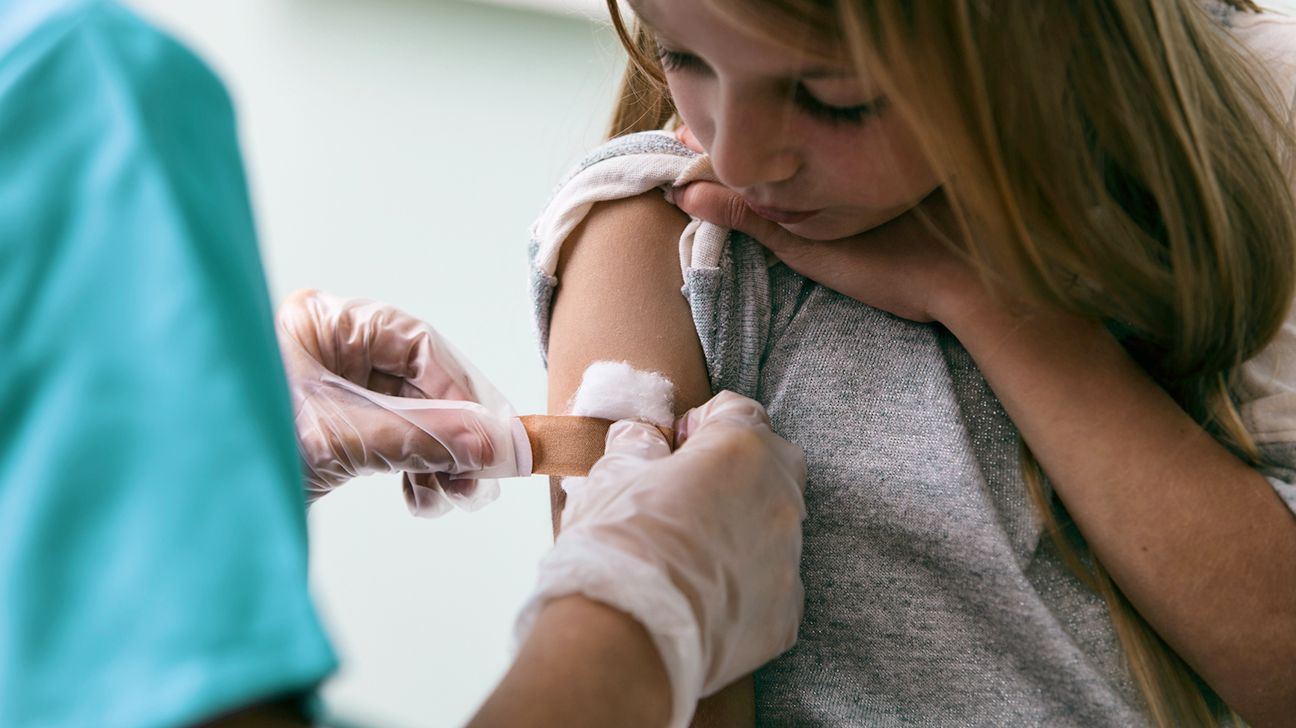
- Trump administration officials say they will no longer recommend the COVID-19 vaccine for people under 65, pregnant people, and healthy children.
- Updated COVID-19 vaccines are now required to undergo placebo-controlled clinical trials prior to approval, which could limit access to shots.
- Experts say it’s shortsighted to exclude pregnant people and children from the list of recommended groups who should get vaccinated against COVID-19.
If you’re under 65 and healthy, it may be difficult for you to get a COVID-19 vaccination this fall.
In a post on X, Health and Human Services Secretary Robert F. Kennedy Jr. announced that the Centers for Disease Control and Prevention (CDC) will no longer recommend updated COVID-19 shots for healthy pregnant people and healthy children.
The change in the CDC recommendation comes after officials at the Food and Drug Administration (FDA) stated in a New England Journal of Medicine paper that the agency planned to reserve COVID-19 vaccines for older adults and for children and adults with underlying medical conditions.
“Although the rapid development of multiple COVID-19 vaccines in 2020 represents a major scientific, medical, and regulatory accomplishment, the benefit of repeat dosing — particularly among low risk persons who may have previously received multiple doses of COVID-19 vaccines, had multiple COVID-19 infections, or both — is uncertain,” they wrote.
Monica Gandhi, MD, a professor of medicine at the University of California San Francisco, agreed that not everyone needs to be vaccinated, but she would like to see more people included in the recommendations for those who need updated COVID-19 shots.
“I would have preferred that the guidance did not name healthy pregnant women as not needing the shot,” Gandhi told Healthline.
“I agree that healthy children with previous immunity (either from vaccination or previous infection) do not need COVID-19 vaccinations, but I would prefer children without previous immunity to get the COVID-19 vaccine,” she said.
In addition, FDA officials have
However, the FDA officials added that they want new vaccines to undergo placebo-controlled clinical trials, a procedure recent vaccine updates haven’t gone through. That means it could take years for new vaccines to be approved.
Gandhi said she has some ethical concerns with this policy.
“The original COVID-19 vaccine trials (such as with the Moderna or Pfizer vaccines) used a placebo-controlled design because there was no prior COVID-19 vaccine, so using a placebo as a comparison was ethical,” she explained.
“However, we now have COVID-19 vaccines, and it would not be ethical to compare a new COVID-19 vaccine with a placebo in a vulnerable individual (e.g., an older person) when their control could be a prior COVID-19 vaccine formulation.”
On its website, the CDC still
In addition, a
It’s also been reported that COVID-19 can increase the risk of pregnancy complications and that pregnant people have a higher risk of becoming seriously ill from the disease.
G. Thomas Ruiz, MD, lead OB-GYN at MemorialCare Orange Coast Medical Center in California, said one reason for these higher risks is that a person becomes immunocompromised during pregnancy.
“The new recommendations are ludicrous,” he told Healthline. “They are shortsighted and irresponsible.”
Officials at the American College of Obstetricians and Gynecologists (ACOG) agreed.
“ACOG is concerned about and extremely disappointed by the announcement that HHS will no longer recommend COVID-19 vaccination during pregnancy,” said Steven Fleischman, MD, the president of ACOG, in a statement. “As ob-gyns who treat patients every day, we have seen firsthand how dangerous COVID-19 infection can be during pregnancy and for newborns who depend on maternal antibodies from the vaccine for protection.”
William Schaffner, MD, an infectious disease expert and a professor of medicine at Vanderbilt University in Tennessee also thinks vaccination during pregnancy is prudent.
“Not only does the vaccine protect the mother, some of that protection passes through the placenta, offering protection to the newborn infant during the first six months of life,” he told Healthline.
The CDC added the COVID-19 vaccination to its recommended immunization schedule for children in 2022.
The agency’s website currently
Officials at the American Academy of Pediatrics (AAP) reported in a statement that an analysis of data collected by Health and Human Services found that 11,199 children were admitted to the hospital with COVID-19 during the 2024-2025 respiratory virus season, 7,746 of whom were under age 5 years.
“By removing the recommendation, the decision could strip families of choice,” said Sean O’Leary, MD, the chair of the AAP Committee on Infectious Diseases.
“Those who want to vaccinate may no longer be able to, as the implications for insurance coverage and access remain unclear. What is clear is that pregnant women, infants, and young children are at higher risk of hospitalization from COVID, and the safety of the COVID vaccine has been widely demonstrated.”
Danelle Fisher, MD, a pediatrician at Providence Saint John’s Health Center in Santa Monica, CA, said she will still recommend to parents that their children get the COVID-19 vaccine.
“I personally think that these recommendations are not based in science,” Fisher told Healthline. “COVID-19 has not gone away in these groups, and so this gives me pause.”
Fisher added she is concerned that parents will see the new recommendations and decide their children don’t need to be vaccinated.
She is also worried that there won’t be enough supply for parents who do want to vaccinate their children.
“This is a huge concern for me,” Fisher said. “We can only recommend for what we have to give.”
The new policies will bring the United States’ recommendations on COVID-19 vaccines closer to the standards in European countries.
However, experts say it may mean that younger and healthier people in the United States will have trouble getting an updated shot if they want one.
They point out that COVID-19 vaccine manufacturers may not produce as many shots under the new guidelines.
In addition, insurance companies are unlikely to cover the cost of a vaccination for someone who doesn’t meet the CDC and FDA recommendations, experts told Healthline.
The CDC currently
However, Ruiz said the cost could rise to somewhere between $500 and $1,000.
“It could become prohibitively expensive,” he said.
He fears the cost, combined with the new recommendations, could “discourage a lot of people” from getting vaccinated.
“The vaccine should be available to anyone who wants it,” he said.
Ruiz said he will continue to recommend the updated shots to his patients. Schaffner agreed that updated vaccines against COVID are still helpful, particularly during respiratory virus season.
“Certainly, everyone in a high risk group should take advantage of the protection provided by COVID vaccine this fall,” he said. “COVID has not disappeared, and we are sure to experience a winter increase once again.”
Fisher noted that vaccines for COVID-19, as well as influenza and other diseases, are simply practical choices.
“I’d rather prevent disease than deal with its consequences,” she said.
Source link : https://www.healthline.com/health-news/cdc-ends-covid-19-vaccine-recommendations-children-pregnant-women-healthy-adults
Author :
Publish date : 2025-05-29 07:36:16
Copyright for syndicated content belongs to the linked Source.














